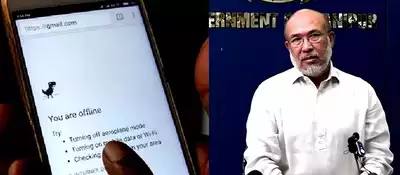In a continuation of the ongoing turmoil, local newspapers and cable TV networks in Manipur remained suspended for the second consecutive day. This suspension, prompted by threats from militants, has left the region without access to local news sources, causing concern among the general populace.
Threats from Militants Lead to Media Suspension
The suspension stems from conflicting demands by different factions of militants, creating a challenging situation for local media houses. While one faction insisted on the publication of a specific statement, another faction from the same outfit threatened severe consequences if the statement was indeed published. This internal conflict within the militant groups has resulted in a state of confusion for journalists working in Manipur, which is already a sensitive border state with around 35 active outfits vying for influence.

Journalists’ Bodies Appeal for Smooth Functioning
Amidst the chaos, two prominent journalists’ bodies, namely the All Manipur Working Journalists Union (AMWJU) and Editors’ Guild Manipur, have appealed fervently to the militants. The bodies emphasized the importance of allowing the smooth functioning of newspapers in the state. The AMWJU spokesman stated that discussions on these critical issues would continue, with a decision expected to be reached in the upcoming general body meeting of the union.
Ongoing Struggle and Past Threats
This recent episode is not the first instance of Manipur’s media facing threats from militants. Both print and electronic media have previously been targeted, prompting calls for restraint and non-interference with media personnel and establishments in the region. The recurring nature of these threats underscores the challenges faced by journalists operating in a complex environment with multiple militant groups.
As Manipur grapples with internal conflicts and threats to press freedom, the future course of action will likely depend on the resolution of differences among the factions involved. The suspension of local media has not only hindered the flow of information but has also raised concerns about the broader implications for freedom of the press in the region.


